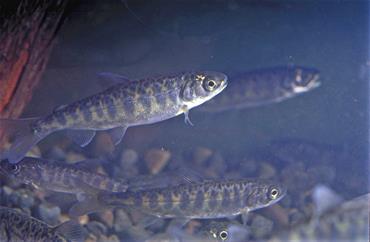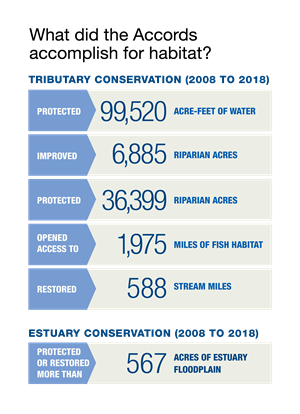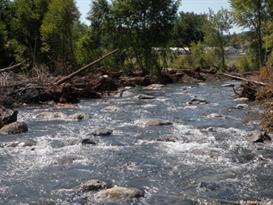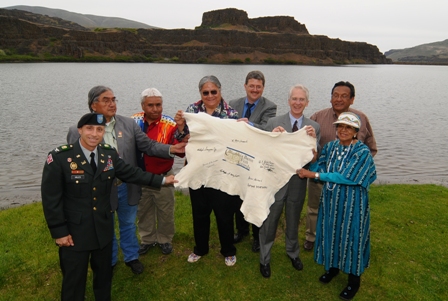 Tribes, federal and state agencies continue to work side by side for the good of endangered salmon and steelhead as they extend the historic Columbia Basin Fish Accords for up to four more years.
Tribes, federal and state agencies continue to work side by side for the good of endangered salmon and steelhead as they extend the historic Columbia Basin Fish Accords for up to four more years.
The original agreements, signed in 2008, provided states and tribes more than $900 million to implement projects benefiting salmon, steelhead and other fish and wildlife, and $50 million for Pacific lamprey passage improvements at federal dams on the Columbia and Snake rivers.
The new Accord extensions could run through September 2022 and will set aside more than $400 million for fish and wildlife mitigation and protection.

Ten years ago, seven tribes, three federal agencies and three states signed the historic Columbia Basin Fish Accords. The agreements committed hundreds of millions of dollars in federal funding for fish operations, habitat and hatchery actions over a 10-year period. The Accords led to hundreds of critical, on-the-ground actions benefiting fish and strengthening partnerships in the region. The agreements also resulted in better projects and more efficient implementation through cost sharing and cost management.
The Accords partnerships over the past 10 years balanced the agencies' needs to perform their missions of navigation, flood risk management, hydropower production, fish and wildlife mitigation, recreation, water supply and irrigation in a manner consistent with tribal trust and treaty rights.
Accords agreements were extended with the Shoshone Bannock Tribes, the Columbia River Inter-Tribal Fish Commission, the Confederated Tribes and Bands of the Yakama Nation, the Confederated Tribes of the Colville Reservation, the Confederated Tribes of the Umatilla Indian Reservation, the Confederated Tribes of the Warm Springs Reservation of Oregon, the states of Idaho and Montana, the Bonneville Power Administration, the U.S. Army Corps of Engineers, and the Bureau of Reclamation.

Overhauling the Columbia River System and its operations for fish has been the centerpiece of the federal agencies' mitigation strategy. The partners have made substantial progress and met the Northwest Power Act's mandates for anadromous fish: improving survival at the dams and providing flows to improve production, migration and survival. Approximately 96 percent of spring-migrating salmon and 93 percent of summer-migrating salmon now safely travel past each dam. Fish travel times and survival per mile are approaching those of an undammed river.

Before and after
The Klickitat Watershed Enhancement Project with the Yakama Nation removed 8 miles of asphalt road, reconnected 31 acres of floodplain, removed a railroad bridge and 34 culverts, and installed tens of thousands of native plants on 60 acres of habitat.
________________________________________________________________________________
At the 2008 celebration, three federal agencies – the Bonneville Power Administration, the U.S. Army Corps of Engineers, and the Bureau of Reclamation – signed 10-year agreements that marked the beginning of an era of collaboration among a diverse array of partners, all committed to working side-by-side in the Columbia Basin for salmon, steelhead and lamprey. The first state and tribal signatories were:
q Columbia River Inter-Tribal Fish Commission,
q Confederated Tribes and Bands of the Yakama Nation,
q Confederated Tribes of the Colville Indian Reservation,
q Confederated Tribes of the Umatilla Indian Reservation,
q Confederated Tribes of the Warm Springs Reservation of Oregon
q State of Idaho
q State of Montana 
Tribal and federal leaders display the hide they signed May 8, 2008, commemorating the historic agreement.
Pictured, from left to right: Colonel Steven Miles, Northwest Division Commander, U.S. Army Corps of Engineers; Antone Minthorn, Chairman, Confederated Tribes of the Umatilla Indian Reservation; Mike Marchand, Chairman, Confederated Tribes of the Colville Indian Reservation; Ralph Sampson, Chairman, Confederated Tribes and Bands of the Yakama Nation; Tim Personius, Deputy Regional Director, Bureau of Reclamation; Steve Wright, Administrator, Bonneville Power Administration; Ron Suppah, Chairman, Confederated Tribes of the Warm Springs Reservation of Oregon; and Fidelia Andy, Chairwoman, Columbia River Inter-Tribal Fish Commission and Yakama Nation Fish and Wildlife Committee.
Over the next three years, the State of Washington, the Shoshone Bannock Tribes and the Kalispel Tribe of Indians also signed Accords with the three federal agencies. Today, three Northwest States and seven tribal partners are collaborating with the federal agencies under the Columbia Basin Fish Accords.
The Accords are designed to supplement the FCRPS BiOp and the Northwest Power and Conservation Council's Fish and Wildlife Program. They provide firm commitments to hydro, habitat and hatchery actions, greater clarity about biological benefits and secure funding for up to four years.